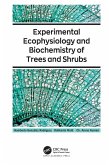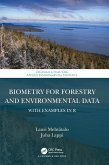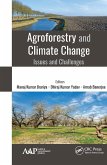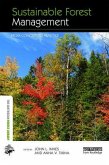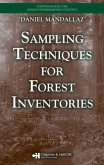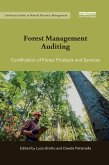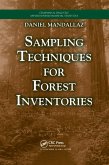Terry J. Logan
Economics of Carbon Sequestration in Forestry on
Terry J. Logan
Economics of Carbon Sequestration in Forestry on
- Gebundenes Buch
- Merkliste
- Auf die Merkliste
- Bewerten Bewerten
- Teilen
- Produkt teilen
- Produkterinnerung
- Produkterinnerung
This book features the main issues discussed in the workshop, "Economics of Carbon Sequestration in Forestry," held in Bergendal, Sweden. It concentrates on how economic principles could contribute to the planning of forestry projects aimed at affecting terrestrial carbon balances.
Andere Kunden interessierten sich auch für
![Experimental Ecophysiology and Biochemistry of Trees and Shrubs Experimental Ecophysiology and Biochemistry of Trees and Shrubs]() Humberto González RodríguezExperimental Ecophysiology and Biochemistry of Trees and Shrubs87,99 €
Humberto González RodríguezExperimental Ecophysiology and Biochemistry of Trees and Shrubs87,99 €![Biometry for Forestry and Environmental Data Biometry for Forestry and Environmental Data]() Lauri Mehtatalo (Joensuu University of Eastern Finland)Biometry for Forestry and Environmental Data174,99 €
Lauri Mehtatalo (Joensuu University of Eastern Finland)Biometry for Forestry and Environmental Data174,99 €![Agroforestry and Climate Change Agroforestry and Climate Change]() Agroforestry and Climate Change87,99 €
Agroforestry and Climate Change87,99 €![Sustainable Forest Management Sustainable Forest Management]() Sustainable Forest Management84,99 €
Sustainable Forest Management84,99 €![Sampling Techniques for Forest Inventories Sampling Techniques for Forest Inventories]() Daniel MandallazSampling Techniques for Forest Inventories116,99 €
Daniel MandallazSampling Techniques for Forest Inventories116,99 €![Forest Management Auditing Forest Management Auditing]() Forest Management Auditing36,99 €
Forest Management Auditing36,99 €![Sampling Techniques for Forest Inventories Sampling Techniques for Forest Inventories]() Daniel MandallazSampling Techniques for Forest Inventories95,99 €
Daniel MandallazSampling Techniques for Forest Inventories95,99 €-
-
-
This book features the main issues discussed in the workshop, "Economics of Carbon Sequestration in Forestry," held in Bergendal, Sweden. It concentrates on how economic principles could contribute to the planning of forestry projects aimed at affecting terrestrial carbon balances.
Hinweis: Dieser Artikel kann nur an eine deutsche Lieferadresse ausgeliefert werden.
Hinweis: Dieser Artikel kann nur an eine deutsche Lieferadresse ausgeliefert werden.
Produktdetails
- Produktdetails
- Verlag: Taylor & Francis Inc
- Seitenzahl: 372
- Erscheinungstermin: 1. Januar 1997
- Englisch
- Abmessung: 262mm x 185mm x 23mm
- Gewicht: 870g
- ISBN-13: 9780849311581
- ISBN-10: 0849311586
- Artikelnr.: 21657840
- Herstellerkennzeichnung
- Libri GmbH
- Europaallee 1
- 36244 Bad Hersfeld
- gpsr@libri.de
- Verlag: Taylor & Francis Inc
- Seitenzahl: 372
- Erscheinungstermin: 1. Januar 1997
- Englisch
- Abmessung: 262mm x 185mm x 23mm
- Gewicht: 870g
- ISBN-13: 9780849311581
- ISBN-10: 0849311586
- Artikelnr.: 21657840
- Herstellerkennzeichnung
- Libri GmbH
- Europaallee 1
- 36244 Bad Hersfeld
- gpsr@libri.de
Logan\, Terry J.
Workshop Overview: Managing Terrestrial Carbon Balances Via Forestry:
Economic Considerations. Working Group Papers: An Economic Approach to
Planting Trees for Carbon Storage. Sequestering Carbon in Natural Forests.
Consideration of Country and Forestry/Land-Use Characteristics in Choosing
Forestry Instruments to Achieve Climate Mitigation Goals. Conceptual Issues
Related to Carbon Sequestration: Uncertainty and Time. Individual Papers:
Incorporating Climate Considerations into the National Basic Plan in Japan.
Economic Impact of Climatic Change on the Global Forest Sector.
Silvicultural Options to Conserve and Sequester Carbon in Forest Systems:
Preliminary Economic Assessment. CO2-Taxing, Timber Rotations, and Market
Implications. Compensating for Opportunity Costs in Forest-Based Global
Climate Change Mitigation. Optimal Subsidies for Carbon: Cost-Effectiveness
and Distributional Considerations. Carbon Sequestration and Tree
Plantations: A Case Study in Argentina. The Economic and Environmental
Impact of Paper Recycling. Forest Biomass-Based Mitigation Strategies: Does
the Timing of Carbon Reductions Matter? Forestry Options for Sequestering
Carbon in Mexico: Comparative Economic Analysis of Three Case Studies. The
Physical Risks of Reforestation as a Strategy to Offset Global Climate
Change. Can Recycling of Waste Help us to Sequester Carbon in Forestry?
Experimental Results and Economic Visions. The Cost of Carbon Sequestration
in Forests: A Positive Analysis. The Time Value of Carbon in Bottom-Up
Strategies. Coercion and Enterprise in the Provision of Environmental
Public Goods: The Case of Carbon Sequestration in the United States. A
Dynamic Model of Forest Carbon Storage in the United States During Climatic
Change. Forest Biomass as Carbon Sink-Economic Value and Forest
Management/Policy Implications. Incremental Costs of Carbon Storage in
Forestry, Bioenergy, and Land-Use. Assessing Timber and Nontimber Values in
Forestry Using a General Equilibrium Framework.
NTI/Sales Copy (NTI already done and approved)
Economic Considerations. Working Group Papers: An Economic Approach to
Planting Trees for Carbon Storage. Sequestering Carbon in Natural Forests.
Consideration of Country and Forestry/Land-Use Characteristics in Choosing
Forestry Instruments to Achieve Climate Mitigation Goals. Conceptual Issues
Related to Carbon Sequestration: Uncertainty and Time. Individual Papers:
Incorporating Climate Considerations into the National Basic Plan in Japan.
Economic Impact of Climatic Change on the Global Forest Sector.
Silvicultural Options to Conserve and Sequester Carbon in Forest Systems:
Preliminary Economic Assessment. CO2-Taxing, Timber Rotations, and Market
Implications. Compensating for Opportunity Costs in Forest-Based Global
Climate Change Mitigation. Optimal Subsidies for Carbon: Cost-Effectiveness
and Distributional Considerations. Carbon Sequestration and Tree
Plantations: A Case Study in Argentina. The Economic and Environmental
Impact of Paper Recycling. Forest Biomass-Based Mitigation Strategies: Does
the Timing of Carbon Reductions Matter? Forestry Options for Sequestering
Carbon in Mexico: Comparative Economic Analysis of Three Case Studies. The
Physical Risks of Reforestation as a Strategy to Offset Global Climate
Change. Can Recycling of Waste Help us to Sequester Carbon in Forestry?
Experimental Results and Economic Visions. The Cost of Carbon Sequestration
in Forests: A Positive Analysis. The Time Value of Carbon in Bottom-Up
Strategies. Coercion and Enterprise in the Provision of Environmental
Public Goods: The Case of Carbon Sequestration in the United States. A
Dynamic Model of Forest Carbon Storage in the United States During Climatic
Change. Forest Biomass as Carbon Sink-Economic Value and Forest
Management/Policy Implications. Incremental Costs of Carbon Storage in
Forestry, Bioenergy, and Land-Use. Assessing Timber and Nontimber Values in
Forestry Using a General Equilibrium Framework.
NTI/Sales Copy (NTI already done and approved)
Workshop Overview: Managing Terrestrial Carbon Balances Via Forestry:
Economic Considerations. Working Group Papers: An Economic Approach to
Planting Trees for Carbon Storage. Sequestering Carbon in Natural Forests.
Consideration of Country and Forestry/Land-Use Characteristics in Choosing
Forestry Instruments to Achieve Climate Mitigation Goals. Conceptual Issues
Related to Carbon Sequestration: Uncertainty and Time. Individual Papers:
Incorporating Climate Considerations into the National Basic Plan in Japan.
Economic Impact of Climatic Change on the Global Forest Sector.
Silvicultural Options to Conserve and Sequester Carbon in Forest Systems:
Preliminary Economic Assessment. CO2-Taxing, Timber Rotations, and Market
Implications. Compensating for Opportunity Costs in Forest-Based Global
Climate Change Mitigation. Optimal Subsidies for Carbon: Cost-Effectiveness
and Distributional Considerations. Carbon Sequestration and Tree
Plantations: A Case Study in Argentina. The Economic and Environmental
Impact of Paper Recycling. Forest Biomass-Based Mitigation Strategies: Does
the Timing of Carbon Reductions Matter? Forestry Options for Sequestering
Carbon in Mexico: Comparative Economic Analysis of Three Case Studies. The
Physical Risks of Reforestation as a Strategy to Offset Global Climate
Change. Can Recycling of Waste Help us to Sequester Carbon in Forestry?
Experimental Results and Economic Visions. The Cost of Carbon Sequestration
in Forests: A Positive Analysis. The Time Value of Carbon in Bottom-Up
Strategies. Coercion and Enterprise in the Provision of Environmental
Public Goods: The Case of Carbon Sequestration in the United States. A
Dynamic Model of Forest Carbon Storage in the United States During Climatic
Change. Forest Biomass as Carbon Sink-Economic Value and Forest
Management/Policy Implications. Incremental Costs of Carbon Storage in
Forestry, Bioenergy, and Land-Use. Assessing Timber and Nontimber Values in
Forestry Using a General Equilibrium Framework.
NTI/Sales Copy (NTI already done and approved)
Economic Considerations. Working Group Papers: An Economic Approach to
Planting Trees for Carbon Storage. Sequestering Carbon in Natural Forests.
Consideration of Country and Forestry/Land-Use Characteristics in Choosing
Forestry Instruments to Achieve Climate Mitigation Goals. Conceptual Issues
Related to Carbon Sequestration: Uncertainty and Time. Individual Papers:
Incorporating Climate Considerations into the National Basic Plan in Japan.
Economic Impact of Climatic Change on the Global Forest Sector.
Silvicultural Options to Conserve and Sequester Carbon in Forest Systems:
Preliminary Economic Assessment. CO2-Taxing, Timber Rotations, and Market
Implications. Compensating for Opportunity Costs in Forest-Based Global
Climate Change Mitigation. Optimal Subsidies for Carbon: Cost-Effectiveness
and Distributional Considerations. Carbon Sequestration and Tree
Plantations: A Case Study in Argentina. The Economic and Environmental
Impact of Paper Recycling. Forest Biomass-Based Mitigation Strategies: Does
the Timing of Carbon Reductions Matter? Forestry Options for Sequestering
Carbon in Mexico: Comparative Economic Analysis of Three Case Studies. The
Physical Risks of Reforestation as a Strategy to Offset Global Climate
Change. Can Recycling of Waste Help us to Sequester Carbon in Forestry?
Experimental Results and Economic Visions. The Cost of Carbon Sequestration
in Forests: A Positive Analysis. The Time Value of Carbon in Bottom-Up
Strategies. Coercion and Enterprise in the Provision of Environmental
Public Goods: The Case of Carbon Sequestration in the United States. A
Dynamic Model of Forest Carbon Storage in the United States During Climatic
Change. Forest Biomass as Carbon Sink-Economic Value and Forest
Management/Policy Implications. Incremental Costs of Carbon Storage in
Forestry, Bioenergy, and Land-Use. Assessing Timber and Nontimber Values in
Forestry Using a General Equilibrium Framework.
NTI/Sales Copy (NTI already done and approved)


